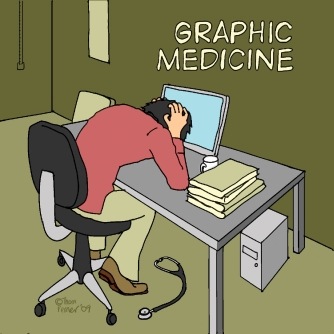We spend a lot of time talking about comics events here at The Beat, but here’s one that managed to elude us completely: the Graphic Medicine Conference. Held in London, UK, it’s was all about, well, what it sounds like, as Daryl Cunningham explains:
The event was well attended. There were about seventy-five delegates there, from all over the world. Quite a lot of people from Canada. The main thrust of the conference was to explore the medical narrative in graphic novels and comics. Sounds a bit dry and surely there’s only a tiny area to explore? Not so. In recent years there’s been a small explosion of medical-themed graphic novels. A few of the creators of these books were at the event. Brian Fies, talking about his book Mom’s Cancer: A Family’s Experience In Comics. Also attending was Philippa Perry, author of Couch Fiction, a graphic novel about psychotherapy. And, of course, I was there with Psychiatric Tales.
More in the link. If nothing else, we have the perfect “distraught at the keyboard” graphic now.





Wow… will the presentations be published?
(And more comics conferences should have lunch, coffee, and wine!)
There are SO MANY medical narratives to choose from. I wrote a little about this a few months ago, after working with a Columbia med-school class:
http://www.comixology.com/articles/362/Doctor-Doctor-Gimme-Your-Views
I assumed comics conferences were attended because artists could have luxuries such as a lunch, coffee and wine once in a while.
I can’t believe doctors, people who actually contribute something valuable to society, were tricked into attending a conference largely attended by bums*
* anyone who works in media is a bum compared to anyone who works in medicine.
Torsten, I believe the conference organizers hope and intend to publish the presentations but haven’t firmed up plans to do so. Some were very good. As a first-of-its-kind event, I thought the conference completely justified its existence (turns out there’s a lot to talk about) and left me hopeful there’d be more like it in the future.
Karen, many good works came up during the discussions. At the end of the conference, participants were also invited to contribute the names of comics that hadn’t been mentioned for future reference and inclusion.
STT Mike, what you’re overlooking are people who work as both cartoonists and medical professionals, like conference organizer Dr. Ian Williams and some of the speakers, as well as healthcare workers who think comics can help them serve their patients and do their jobs better. One of the most impressive things I saw at the conference was the easy, egalitarian, respectful way that doctors and professors mixed with ink-stained wretches. While you may think “anyone who works in media is a bum compared to anyone who works in medicine,” not everyone who works in medicine agrees.
Hi Guys,
Sorry, I should have alerted you to the conference beforehand! I feel it went very well. The wine went down well too. The point of the conference was to discuss the interface between comics and medicine and the various areas that interface covers, for instance- whether comics made by artists who have suffered illness or, like Brian, have cared for relatives, are worthy of study by healthcare professions hoping to gain insight into the patient experience (I would argue that they certainly are, and wrote an MA dissertation to that effect). The use of comics in both medical and patient education was discussed, and so were the literary merits of some of the comics works that relate to this interdisciplinary field of study- Paul Gravett gave a magnificent run through in his address.
And it was great fun, and there was a real buzz, and not too many bums hanging around, even with free wine and coffee on offer, and I’m sure this area will grow.
Brian, you were marvelous and everyone was blown away by your talk.
More discussion of this subject at my website
http://www.graphicmedicine.org
We intend to publish the papers and proceedings as a book, yes.
oh…I did the ‘the perfect “distraught at the keyboard” graphic’ by the way, under my nom de plume of ‘Dr Thom Ferrier’
http://www.thomferrier.com
all the best
Ian
I thoroughly recommend attending a conference the subject of which interests you but is not your specialist subject.
Last Thursday I learnt so much about the suitability of the graphic novel format for many serious subjects and the contribution that comic books make to education, culture and medicine, especially medicine. It was great to meet so many doctors, nurses, psychiatrists, authors and academics from all over the world and to hear original and great papers about comic book culture’s contribution to medicine and mental health. I have come away with a great list of comics and books that will inform, educate and entertain me. But more than that I had fun and made wonderful and I hope lasting connections. I had no idea when I wrote a comic about psychotherapy what had already gone before me and I’m very excited about what is coming next. Lets keeps integrating everything we know and sharing it.